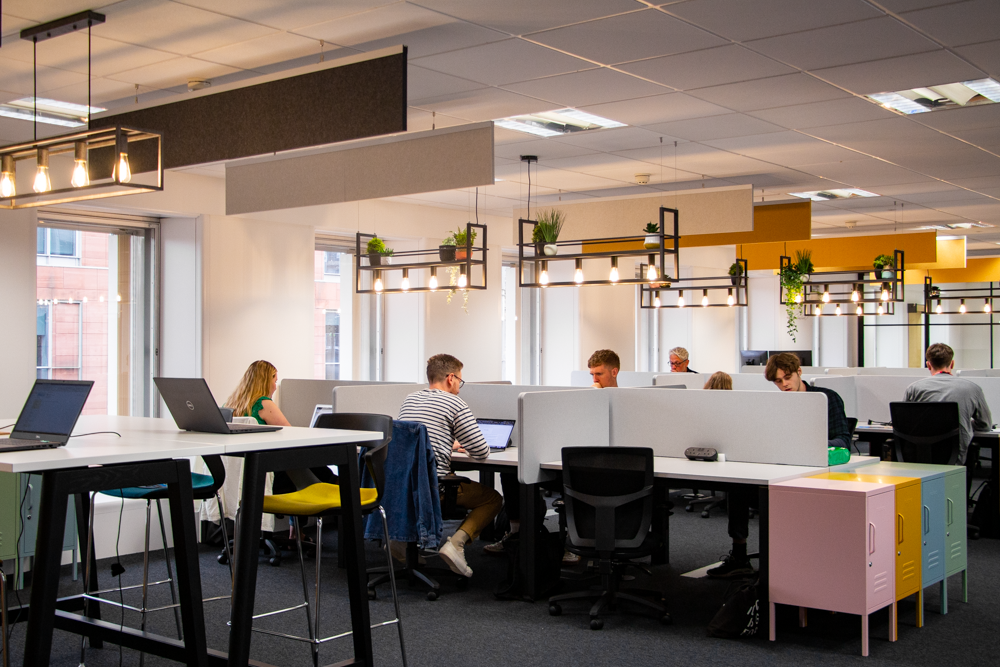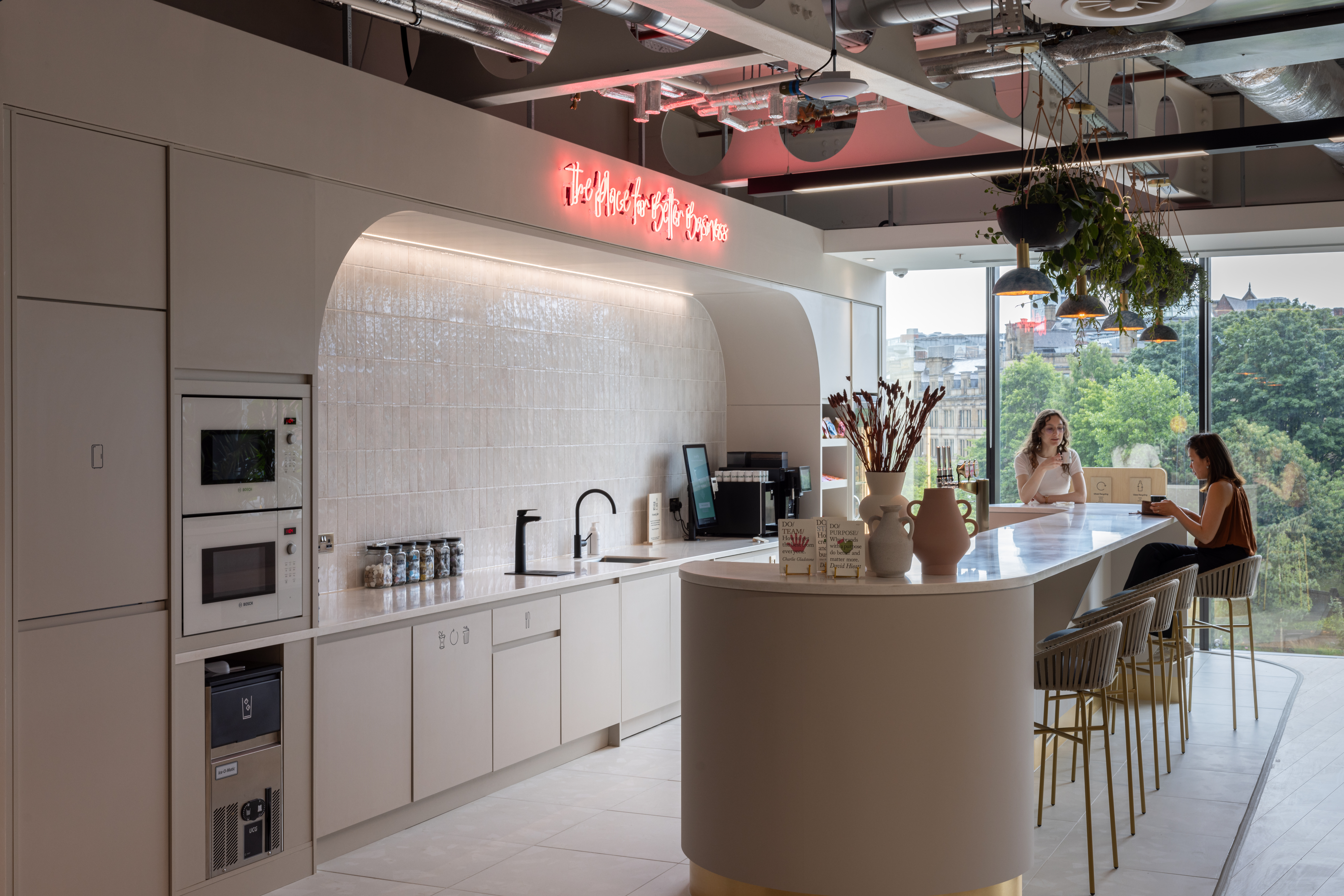Photo Credit – Patch
While it doesn’t seem to be completely game-changing, there’s no doubt tech has changed the coworking industry for good. We might not have self-loading dishwashers just yet, but we have smart workflows and snazzy dashboards and AI reporting – all of which free up time for the things that matter.
We wanted to hear more about the nitty gritty, real-life impact of tech and AI behind the scenes in coworking. So we tracked down some of the industry’s dedicated Operations Teams, and asked them how they’re using the newest tools in their toolboxes.
Tech for a smoother workday
If you’re a coworking veteran, you might remember the days when connecting to the internet in your workspace wasn’t guaranteed.
“The advancement of technology in our industry has enabled us to operate so much better. Thinking back to when I first started in this industry – you were lucky if your connection worked all day, every day,” Gal Leslie, Sales & Marketing Director at 2-Work reflects. “Afternoons were a nightmare when America went online because there were so many dips in service.”

Photo Credit – 2-Work
Now, most of us go to work each day feeling confident that we’ll not only get online, but that we’ll be able to instantly open doors with our phones, make our hot drinks in seconds with a hot water tap, and connect with our colleagues and coworkers via instant messaging, whether they’re in the space that day or not. If something isn’t working, we expect an immediate fix – and with tech teams working in the background to keep everything running smoothly, we often get it.
“With Yardi, we get instant responses from the Help Desk,” Gal tells us. “The team is brilliant. Really helpful, always on it. Our members know that if, at any point, there’s a blip with our technology, it can be fixed or upgraded in a blink.”
Tech that frees up time for what matters
All the best coworking spaces are now values-driven, but with lots of individual needs to accommodate each day, operating by those values isn’t always so easy. By automating some of the more time consuming back-office tasks, technology is helping coworking teams to spend more time where they’re needed most: with their members.
“Before I left my last hospitality job, I sent my team a video of a robotic arm in China that makes and hands over the perfect cup of coffee,” Ben Newton, Head of Operations at Patch, tells us. “It was a joke, of course! Obviously the rapid, repetitive movement of making a coffee can be done by a robot, but the human side of hospitality can’t be replaced. If a coffee machine cleans itself or a dishwasher empties itself, fantastic – those are the tedious jobs that are important but ultimately don’t add much to the member experience. But it’s the human touch that we value. That’s what matters to us.”
x+why is another workspace provider well known for its purpose. “Our mission is to change the way the world works for good,” says Ed Hobbs, Regional Operations Manager. “Being able to look at an access control data sheet and get an overview of the whole week is great. We want people to be in our buildings and using our services, but we also want to understand where the gaps are.” Drawing on real-time data allows coworking operators like x+why to make an impact in the wider community. “Our data insight helps us to be more creative with the different offers we put out across the week. If we know Mondays and Fridays are quieter, we can offer our space for charitable use, or to give it to those people who might not otherwise be able to afford to use a space like this.”

Photo Credit – x+why
Human connection = happy teams
Coworking is closely tied to hospitality, so it makes sense that coworking team members are often recruited from the hospitality industry. “Hospitality people want to be looking after clients, not hiding in the back office,” Gal tells us. “Our tech frees our team up to concentrate on the customer journey, which increases their job satisfaction.”
And, of course, happy teams = happy members. 2-Work’s tech support is crucial to the growth of the community, and in turn, the business. “If we didn’t have a dedicated tech support service, we wouldn’t get such great reviews on Trustpilot or Google. Because they’re not spending time fixing glitches, our team can really look after our members.”
Tech for planetary wellbeing
Being B-Corp certified, it’s important that x+why is able to track its overall sustainability really closely. Amongst other things, Ed needs to know how much energy the company is using and how that breaks down per head.
“In the past, we’ve tracked a number of different metrics across different platforms. We partner with a lot of landlords, so sometimes we’ve relied on other people to give us the data we need. Now we’re setting up a live dashboard that will allow us to see all of our data on energy usage and waste across all of our buildings.”
Ed knows that it’s not enough, though, for x+why just to know the numbers and tweak accordingly. The whole community needs to be on board. “We can be as sustainable as we like, but we need our members to care too. If our members are putting plastic in the glass recycling or leaving their lights or laptops on all day, it’s going to affect our overall levels of sustainability.” To engage audiences in important issues like saving the planet, gamification is becoming more and more popular and effective. “We want to put our members in the driving seat when it comes to sustainability, and gamification – setting energy saving challenges as members move around the building, for example – could help us do that. Hopefully we can make reducing their footprint not only easier, but a bit more fun.”
In the future, Ed hopes there will be a way for x+why’s members to power their spaces using their own body heat. “If you’ve even been to a house party crammed with loads of people, you’ll know just how much heat humans create. It would be really interesting to explore how you could harness and pump that heat around buildings rather than using central heating systems, which consume so much energy.”
The future of tech in coworking spaces
Technology has already made a massive impact in the world of coworking – and with tech advances being made all the time, we can expect more changes in the very near future.
“We want technology to amplify the human experience at x+why, and make it as inclusive and engaging as possible,” Says Ed. “It’s great that people have the flexibility to work from home now – but how do we make sure that they want to come into our spaces too?” Perhaps the next step is for technology to help the coworking industry solve the different challenges that come up for their members each day at speed. “We need to understand different members’ and companies’ needs by creating a constant feedback loop via technology, so we can learn and respond in real time.”
AI is already helping coworking operators plan their spaces effectively. “We’ve just started having a conversation about how AI could help us with space planning. It’s so interesting that a robot could design a space for us,” Ben from Patch muses, “but we can’t see it managing an end-to-end process yet. There would definitely still be a lot of our own human creativity required.”
The case for keeping things simple
Is hi-tech always best? Interestingly, 2-Work is choosing to take a step back, rather than forward, when it comes to accessing their newest building.
“When we launched, it took 15 seconds to open our door with our app,” Gal tells us. “That might not sound like a long time but when you’re standing outside with a coffee in your hand, it is. We’ve reduced that time delay down to four or five seconds now, which is fine – but ideally we want our doors to open instantly. That’s why we’re going back to traditional fobs when we open our second location.”
Something that each and every coworking insider we’ve spoken to agrees on is that coworking is a uniquely human industry. “Robots and AI can replace the boring jobs but there always has to be personality, there always has to be the human touch,” Ben from Patch says. “If we lose that, what’s the point?”
This article was researched and written by humans Emilie Lashmar and Rose Radtke, with the help of AI. We interviewed all the Operations teams on Zoom, and used Otter.ai to record and transcribe our conversations. We used Notion to capture our thinking.
Thank you to Yardi for sponsoring this article. Yardi is a software company that is passionate about creating engaging content whilst championing those working within this evolving industry. Their extensive range of software products and services is used by a variety of coworking and real estate companies and professionals.